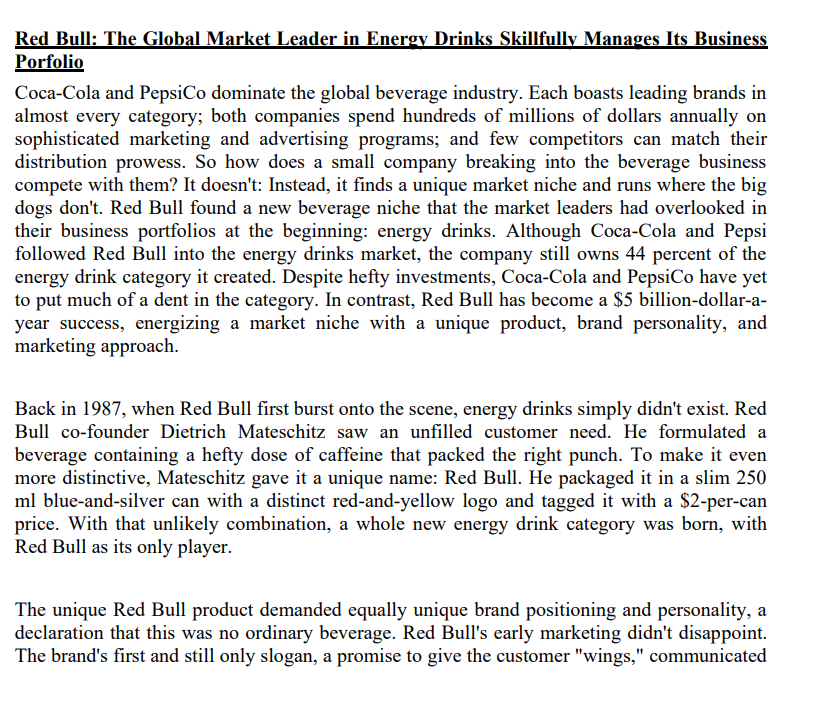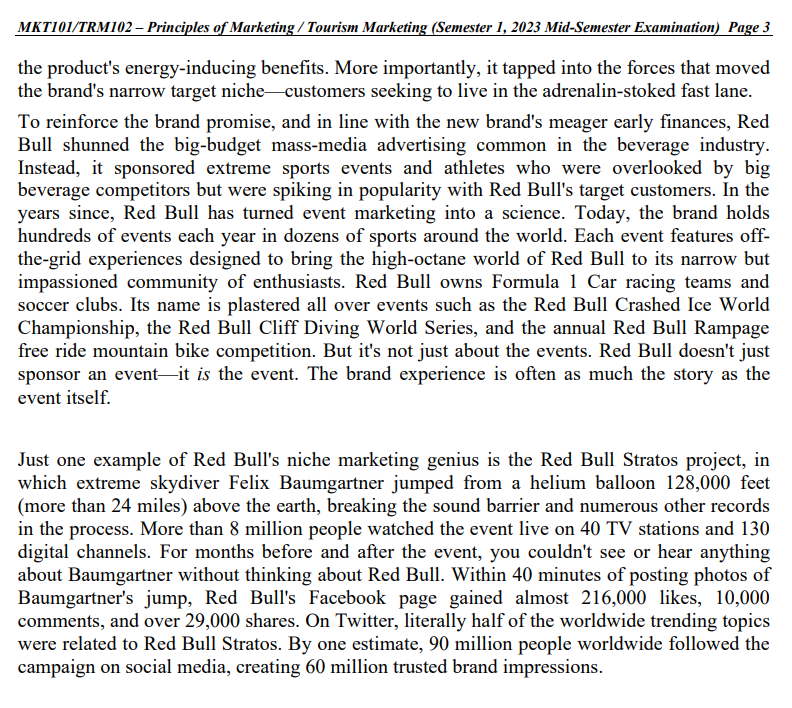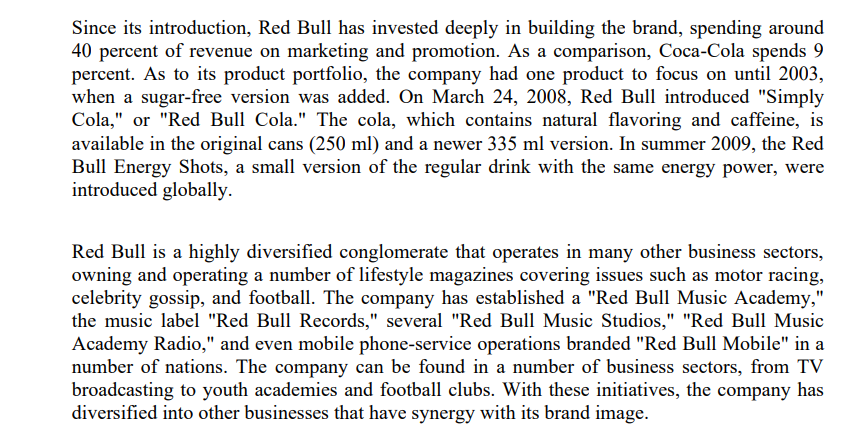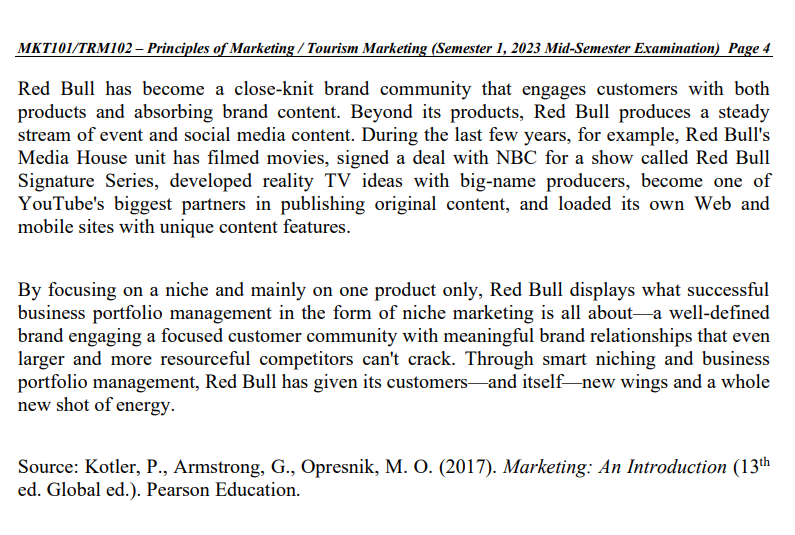Answered step by step
Verified Expert Solution
Question
1 Approved Answer
Red Bull: The Global Market Leader in Energy Drinks Skillfully Manages Its Business Porfolio Coca-Cola and PepsiCo dominate the global beverage industry. Each boasts leading





Red Bull: The Global Market Leader in Energy Drinks Skillfully Manages Its Business Porfolio Coca-Cola and PepsiCo dominate the global beverage industry. Each boasts leading brands in almost every category; both companies spend hundreds of millions of dollars annually on sophisticated marketing and advertising programs; and few competitors can match their distribution prowess. So how does a small company breaking into the beverage business compete with them? It doesn't: Instead, it finds a unique market niche and runs where the big dogs don't. Red Bull found a new beverage niche that the market leaders had overlooked in their business portfolios at the beginning: energy drinks. Although Coca-Cola and Pepsi followed Red Bull into the energy drinks market, the company still owns 44 percent of the energy drink category it created. Despite hefty investments, Coca-Cola and PepsiCo have yet to put much of a dent in the category. In contrast, Red Bull has become a $5 billion-dollar-ayear success, energizing a market niche with a unique product, brand personality, and marketing approach. Back in 1987, when Red Bull first burst onto the scene, energy drinks simply didn't exist. Red Bull co-founder Dietrich Mateschitz saw an unfilled customer need. He formulated a beverage containing a hefty dose of caffeine that packed the right punch. To make it even more distinctive, Mateschitz gave it a unique name: Red Bull. He packaged it in a slim 250 ml blue-and-silver can with a distinct red-and-yellow logo and tagged it with a \$2-per-can price. With that unlikely combination, a whole new energy drink category was born, with Red Bull as its only player. The unique Red Bull product demanded equally unique brand positioning and personality, a declaration that this was no ordinary beverage. Red Bull's early marketing didn't disappoint. The brand's first and still only slogan, a promise to give the customer "wings," communicated the product's energy-inducing benefits. More importantly, it tapped into the forces that moved the brand's narrow target niche-customers seeking to live in the adrenalin-stoked fast lane. To reinforce the brand promise, and in line with the new brand's meager early finances, Red Bull shunned the big-budget mass-media advertising common in the beverage industry. Instead, it sponsored extreme sports events and athletes who were overlooked by big beverage competitors but were spiking in popularity with Red Bull's target customers. In the years since, Red Bull has turned event marketing into a science. Today, the brand holds hundreds of events each year in dozens of sports around the world. Each event features offthe-grid experiences designed to bring the high-octane world of Red Bull to its narrow but impassioned community of enthusiasts. Red Bull owns Formula 1 Car racing teams and soccer clubs. Its name is plastered all over events such as the Red Bull Crashed Ice World Championship, the Red Bull Cliff Diving World Series, and the annual Red Bull Rampage free ride mountain bike competition. But it's not just about the events. Red Bull doesn't just sponsor an event - it is the event. The brand experience is often as much the story as the event itself. Just one example of Red Bull's niche marketing genius is the Red Bull Stratos project, in which extreme skydiver Felix Baumgartner jumped from a helium balloon 128,000 feet (more than 24 miles) above the earth, breaking the sound barrier and numerous other records in the process. More than 8 million people watched the event live on 40 TV stations and 130 digital channels. For months before and after the event, you couldn't see or hear anything about Baumgartner without thinking about Red Bull. Within 40 minutes of posting photos of Baumgartner's jump, Red Bull's Facebook page gained almost 216,000 likes, 10,000 comments, and over 29,000 shares. On Twitter, literally half of the worldwide trending topics were related to Red Bull Stratos. By one estimate, 90 million people worldwide followed the campaign on social media, creating 60 million trusted brand impressions. Since its introduction, Red Bull has invested deeply in building the brand, spending around 40 percent of revenue on marketing and promotion. As a comparison, Coca-Cola spends 9 percent. As to its product portfolio, the company had one product to focus on until 2003, when a sugar-free version was added. On March 24, 2008, Red Bull introduced "Simply Cola," or "Red Bull Cola." The cola, which contains natural flavoring and caffeine, is available in the original cans (250ml) and a newer 335ml version. In summer 2009 , the Red Bull Energy Shots, a small version of the regular drink with the same energy power, were introduced globally. Red Bull is a highly diversified conglomerate that operates in many other business sectors, owning and operating a number of lifestyle magazines covering issues such as motor racing, celebrity gossip, and football. The company has established a "Red Bull Music Academy," the music label "Red Bull Records," several "Red Bull Music Studios," "Red Bull Music Academy Radio," and even mobile phone-service operations branded "Red Bull Mobile" in a number of nations. The company can be found in a number of business sectors, from TV broadcasting to youth academies and football clubs. With these initiatives, the company has diversified into other businesses that have synergy with its brand image. MKT101/TRM102 - Principles of Marketing / Tourism Marketing (Semester 1, 2023 Mid-Semester Examination) Page 4 Red Bull has become a close-knit brand community that engages customers with both products and absorbing brand content. Beyond its products, Red Bull produces a steady stream of event and social media content. During the last few years, for example, Red Bull's Media House unit has filmed movies, signed a deal with NBC for a show called Red Bull Signature Series, developed reality TV ideas with big-name producers, become one of YouTube's biggest partners in publishing original content, and loaded its own Web and mobile sites with unique content features. By focusing on a niche and mainly on one product only, Red Bull displays what successful business portfolio management in the form of niche marketing is all about-a well-defined brand engaging a focused customer community with meaningful brand relationships that even larger and more resourceful competitors can't crack. Through smart niching and business portfolio management, Red Bull has given its customers - and itself - new wings and a whole new shot of energy. Source: Kotler, P., Armstrong, G., Opresnik, M. O. (2017). Marketing: An Introduction (13 th ed. Global ed.). Pearson Education. Question 1: Based on the case, discuss 3 (THREE) points that distinguish Red Bull from other beverage companies. (30 marks) Question 2: Identify 2 (TWO) microenvironmental factors and 1 (ONE) macroenvironmental factor from the case that have affected Red Bull. (30 marks) Question 3: In your opinion, describe 2 (TWO) opportunities and 2 (TWO) threats of Red Bull. (40 marks)
Step by Step Solution
There are 3 Steps involved in it
Step: 1

Get Instant Access to Expert-Tailored Solutions
See step-by-step solutions with expert insights and AI powered tools for academic success
Step: 2

Step: 3

Ace Your Homework with AI
Get the answers you need in no time with our AI-driven, step-by-step assistance
Get Started


